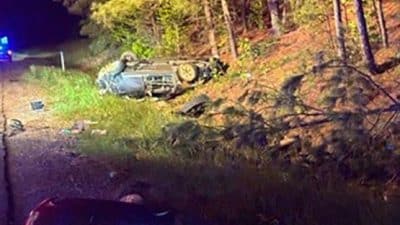
The closure extends from Riprap Trailhead (mile 90 on Skyline Drive) to just south of Wildcat Ridge parking where the AT crosses Skyline Drive (mile 92.5). This approximately 2.5-mile camping closure does not impact any designated campsites or AT shelters (or the Trail itself) – merely off-trail camping.
Recent overnight camper activity along this stretch of the AT resulted in two black bear food rewards. Because of the increased risk to camper and bear safety, the Superintendent has issued this temporary closure to overnight camping until further notice.
Black bears by nature tend to be wary of people. However, if you encounter a black bear while hiking or camping, follow these common-sense safety tips.
- Never feed or approach a bear. Park regulations require at least 50 yards to safely view a bear.
- Never store food or scented items (such as tooth paste) in your tent.
- Remain calm if you encounter a bear.
- Make the bear aware of your presence by speaking in an assertive voice, singing, clapping your hands, or making other noises.
- Make sure the bear has an escape route.
- Avoid direct eye contact and never run from a bear. Instead, slowly back away.
- To scare the bear away, make loud noises by yelling, banging pots and pans or using an air horn. Make yourself look as big as possible by waving your arms. If you are with someone else, stand close together with your arms raised above your head.
- The bear may utter a series of huffs, make popping jaw sounds by snapping its jaws and swat the ground. These are warning signs that you are too close. Slowly back away, avoid direct eye contact and do not run.
- If a black bear stands on its hind legs or moves closer, it may be curious and trying to get a better view or detect scents in the air. It is usually not a threatening behavior.
- Black bears will sometimes “bluff charge” when cornered, threatened or attempting to defend a food source. Stand your ground, avoid direct eye contact, then slowly back away and do not run.
- If the bear does not leave, move to a secure area or at least 200 yards away.
Use bear spray only as a last resort and direct the spray at the bear’s sensitive nasal and eye areas. Black bear attacks are extremely rare. If a black bear does attack, always fight back! If you have to fight back, hit the bear’s eyes or nose.
Report Incidents
If you become aware of a situation where a bear is “hanging out” in a campground or picnic area, where people are deliberately feeding a bear, or if you are involved in bluff charge situation or an actual contact incident – report it to park staff immediately. Emergency Line: 800-732-0911
More information can be found at http://www.dgif.virginia.gov/wildlife/bear/living-with-black-bears/










